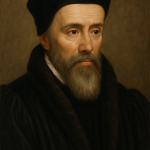
William Tyndale was an English scholar, translator, and Reformation martyr whose greatest achievement was rendering the Bible into clear, vigorous English directly from Hebrew and Greek. His translation became the foundation for nearly all subsequent English Bibles, including the King James Version. Tyndale’s work spread Reformation theology across England, challenging the authority of the Roman Catholic Church and the English crown. Hunted as a heretic, betrayed by friends, and ultimately executed, he left a legacy that transformed English religion, language, and culture.
Early Life and Education
Tyndale was born around 1494 in Gloucestershire, England. He studied at Magdalen Hall, Oxford, and later at Cambridge, where he was exposed to humanist scholarship and the writings of Erasmus. Tyndale mastered multiple languages—including Latin, Greek, Hebrew, French, German, and Italian—preparing him for his life’s calling: to give the English people the Bible in their own tongue.
At a time when unauthorized English translations were forbidden, Tyndale declared that he would make “the boy that driveth the plough” know more of Scripture than the learned clergy who opposed reform.
Bible Translation and Exile
Unable to gain approval in England for his translation project, Tyndale left for continental Europe in 1524. He worked first in Hamburg and Cologne, and then in Worms, where his New Testament translation was printed in 1526. Copies were smuggled into England and eagerly read, though condemned by bishops and publicly burned.
Tyndale’s translation was revolutionary not only because it was in English but because it was rooted in the original languages. His New Testament captured the rhythm and clarity of spoken English, shaping the literary future of the language itself.
Theology and Writings
Tyndale embraced the doctrines of the continental Reformation: justification by faith alone, the authority of Scripture, and the rejection of purgatory, indulgences, and priestly mediation. His prose writings—such as The Obedience of a Christian Man (1528)—argued for the supremacy of God’s Word over all human authority, including kings and popes.
Though critical of the papacy, Tyndale also opposed unrestrained rebellion, emphasizing obedience to rulers except where it conflicted with God’s law. His pastoral concern was that ordinary Christians know the gospel and live according to Scripture.
Persecution and Martyrdom
Tyndale’s years in exile were spent in constant danger. He revised his New Testament, worked on translating the Old Testament from Hebrew, and wrote theological treatises defending the Reformation. But in 1535, he was betrayed by Henry Phillips, arrested near Antwerp, and imprisoned at Vilvoorde.
In 1536, after eighteen months in prison, Tyndale was strangled and then burned at the stake. His final prayer was, “Lord, open the King of England’s eyes.” Within a few years, Henry VIII authorized the English Bible—largely based on Tyndale’s work.
Legacy
William Tyndale’s influence cannot be overstated. Over 80 percent of the King James Bible (1611) is drawn directly from his translations. Phrases such as “let there be light,” “the powers that be,” and “the spirit is willing, but the flesh is weak” entered everyday English through Tyndale’s pen.
He combined theological clarity with literary genius, shaping not only Protestant piety but also the English language itself. Tyndale’s courage and sacrifice secured for the English-speaking world the priceless gift of Scripture in its own tongue.
Books on William Tyndale
William Tyndale: A Biography
By David Daniell (1994)
The definitive modern biography, tracing Tyndale’s scholarship, translations, and martyrdom with depth and clarity.Tyndale: The Man Who Gave God an English Voice
By David Teems (2012)
A popular and accessible account of Tyndale’s life and literary genius.Let There Be Light: William Tyndale and the Making of the English Bible
By David Daniell (1994)
Focuses on Tyndale’s translation work and its impact on English-speaking Christianity.William Tyndale: A Biography
By Brian Moynahan (2002)
A well-written, narrative-driven portrait of Tyndale’s dramatic life.Obedience of a Christian Man
By William Tyndale (1528; many modern editions)
Tyndale’s own treatise on Scripture and authority, influential even on Henry VIII.The English Bible: From KJV to NIV
By Jack P. Lewis (1981)
Examines the history of English Bible translation, with Tyndale as the essential starting point.God’s Outlaw: The Story of William Tyndale
By Brian Edwards (1976)
A classic evangelical biography emphasizing Tyndale’s faith and courage.The Reformation: A History
By Diarmaid MacCulloch (2003)
Provides wider context, situating Tyndale within the English and European Reformations.
